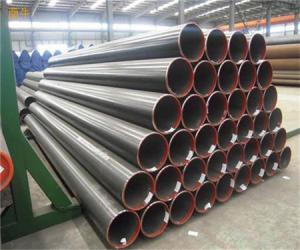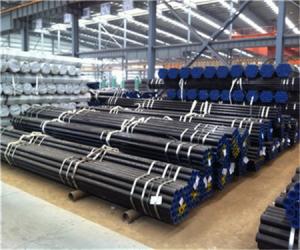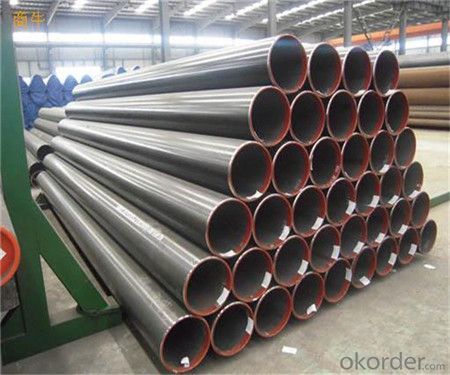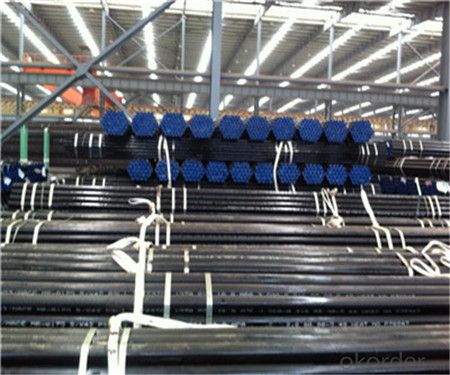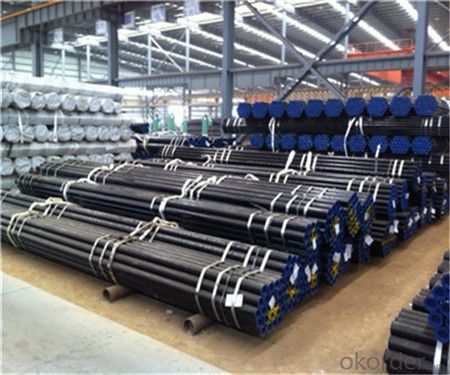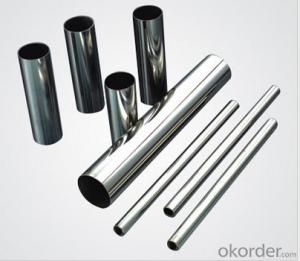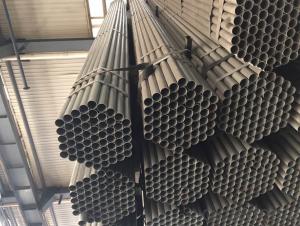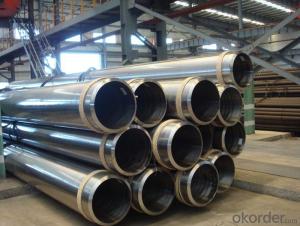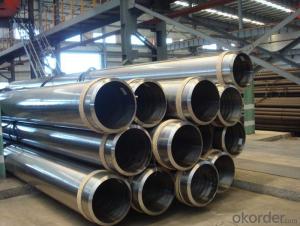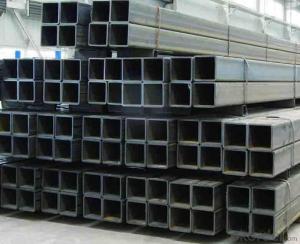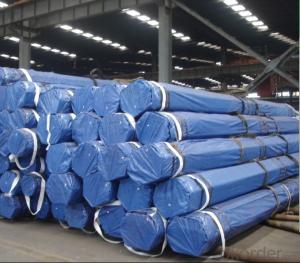Stainless Steel Welded Pipe mechanical Pipe A554/DIN/EN10296-2/ JIS G3446/GB/T 12770
- Loading Port:
- Tianjin
- Payment Terms:
- TT or LC
- Min Order Qty:
- 20 m.t.
- Supply Capability:
- 5000 m.t./month
OKorder Service Pledge
OKorder Financial Service
You Might Also Like
1、Structure of Stainless Steel Welded Pipe mechanical Pipe ASTM A554/DIN/EN10296-2/ JIS G3446/GB/T 12770 Description:
Stainless steel welded pipe is actually a cover term, covering a wide range of alloy and making them suitable for different attributes that are used in a very wide and large numbers of different industries. Stainless steel pipe is resistant to erosion, highly flexible, powerful, easy to use, and can be done in distinct approaches, which means that more and more stainless steel was used as a construction material for large-scale, high impact buildings. It can be molded, rolling, and it can create amazing shapes to make it perfect, It is used as experimental buildings. Lightweight traits of hard welded steel pipe makes it perfect for things used in the construction of off shore oil and gas platforms. Crude oil is a corrosive substance and it is positive in the construction of the new drilling platform that uses high alloy, super austenitic welded steel pipe.
2、Main Features of Stainless Steel Welded Pipe mechanical Pipe ASTM A554/DIN/EN10296-2/ JIS G3446/GB/T 12770:
• High manufacturing accuracy
• High strength
• Small inertia resistance
• Strong heat dissipation ability
• Good visual effect
•Reasonable price
3、Stainless Steel Welded Pipe mechanical Pipe ASTM A554/DIN/EN10296-2/ JIS G3446/GB/T 12770 Images:
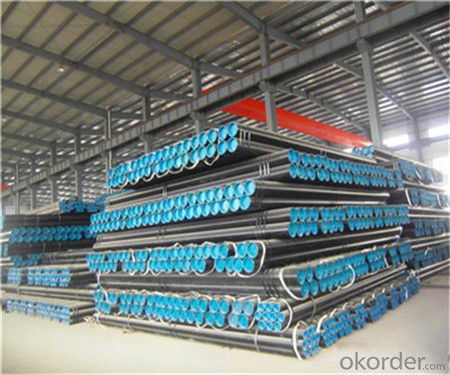
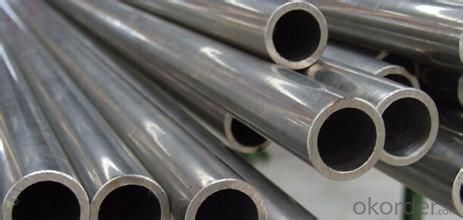
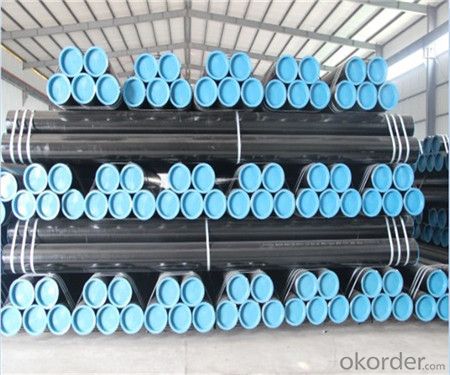
4、Stainless Steel Welded Pipe mechanical Pipe ASTM A554/DIN/EN10296-2/ JIS G3446/GB/T 12770 Specification:
Size:
| OD(mm) | WT(mm) | |||||||||||||
| 0.5 | 0.6 | 0.7 | 0.8 | 0.9 | 1 | 1.2 | 1.5 | 2 | 2.5 | 3 | 4 | 5 | ||
| 9.5 | ||||||||||||||
| 12 | ||||||||||||||
| 1/2' | 12.7 | |||||||||||||
| 13 | ||||||||||||||
| 14 | ||||||||||||||
| 5/8' | 15.9 | |||||||||||||
| 3/8' | 19.1 | |||||||||||||
| 7/8' | 22.2 | |||||||||||||
| 1' | 25.4 | |||||||||||||
| 1-1/8' | 28.6 | |||||||||||||
| 1-1/4' | 31.8 | |||||||||||||
| 1-1/2' | 38.1 | |||||||||||||
| 40 | ||||||||||||||
| 45 | ||||||||||||||
| 2' | 50.8 | |||||||||||||
| 52 | ||||||||||||||
| 2-1/4' | 57.15 | |||||||||||||
| 2-3/8' | 60.3 | |||||||||||||
| 2-1/2' | 63.5 | |||||||||||||
| 70 | ||||||||||||||
| 3' | 76.2 | |||||||||||||
| 85 | ||||||||||||||
| 3-1/2' | 88.9 | |||||||||||||
| 4' | 101.6 | |||||||||||||
| 4-1/8' | 104.78 | |||||||||||||
| 4-1/4' | 107.95 | |||||||||||||
| 4-1/2' | 114.3 | |||||||||||||
| 5-1/4' | 133.35 | |||||||||||||
| 6-1/4' | 158.75 | |||||||||||||
| 8-5/8' | 219.08 | |||||||||||||
Tolerance:
| Standard | OD(mm) | WT(mm) | Tolerance of OD(mm) | Tolerance of WT(mm) | Tolerance of Length(mm) |
| ASTM A554 | ≤12.7 | 0.51~1.24 | ±0.10 | ±10.00%T (±10.00% of nominal wall thickness) | +4.08 -0 |
| >12.7~25.4 | 0.51~1.65 | ±0.13 | |||
| >1.65~3.4 | ±0.25 | ||||
| >25.4~38.1 | 0.64~1.65 | ±0.20 | |||
| >1.65~3.40 | ±0.25 | ||||
| >38.1~50.8 | 0.64~1.24 | ±0.25 | |||
| >1.24~2.11 | ±0.28 | ||||
| >50.8~63.5 | >2.11~3.78 | ±0.30 | |||
| 0.81~1.65 | ±0.30 | ||||
| >1.65~2.77 | ±0.33 | ||||
| >63.5~88.9 | >2.77~4.19 | ±0.36 | |||
| 0.81~4.19 | ±0.36 | ||||
| >88.9~127.0 | 0.89~4.19 | ±0.51 | |||
| >4.19 | ±0.64 | ||||
| >127.0~190.5 | 1.24~6.35 | ±0.64 | |||
| >6.35 | ±0.76 | ||||
| GB/T12770 | <25 | ±0.15 | Clod Rolled ≤0.50 ±0.05 >0.50~1.00 ±0.11 >1.00~2.00 ±0.17 >2.00~3.00 ±7.00%S >3.00 ±10.0%S Hot Rolled ±10.00%S | +20.00 -0 | |
| ≥25~40 | ±0.18 | ||||
| ≥40~50 | ±0.20 | ||||
| ≥50~60 | ±0.23 | ||||
| ≥60~70 | ±0.30 | ||||
| ≥70~80 | ±0.30 | ||||
| ≥80~90 | ±0.30 | ||||
| ≥90~100 | ±0.40 | ||||
| ≥100~200 | ±0.50%D | ||||
| ≥200 | To BeAgreed | ||||
| JIS G3446 | <50 | ±0.25 | <3.00 ±0.30 | +50 -0 | |
| ≥50 | ±0.5% | ≥3.00 ±10.00% |
5、FAQ of Stainless Steel Welded Pipe mechanical Pipe ASTM A554/DIN/EN10296-2/ JIS G3446/GB/T 12770:
①How is the quality of your products?
Our products are manufactured strictly according to national and internaional standard, and we take a test on every pipe before delivered out. If you want see our quality certifications and all kinds of testing report, please just ask us for it.
Guaranteed: If products’ quality don’t accord to discription as we give or the promise before you place order, we promise 100% refund.
②How about price?
Yes, we are factory and be able to give you lowest price below market one, and we have a policy that “ for saving time and absolutely honest business attitude, we quote as lowest as possible for any customer, and discount can be given according to quantity”,if you like bargain and factory price is not low enough as you think, just don’t waste your time.Please trust the quotation we would give you, it is professional one.
③Why should you chose us?
Chose happens because of quality, then price, We can give you both.Additionally, we can also offer professional products inquiry, products knowledge train(for agents), smooth goods delivery, exellent customer solution proposals.Our service formula: good quality+good price+good service=customer’s trust
SGS test is available, customer inspection before shipping is welcome, third party inspection is no problem.
- Q: How do steel pipes compare to other materials, such as PVC or copper?
- Steel pipes have several advantages over other materials such as PVC or copper. Firstly, steel pipes are incredibly durable and strong, making them suitable for heavy-duty applications and high-pressure environments. Additionally, steel pipes have a longer lifespan compared to PVC or copper, as they are less prone to cracking, corrosion, or degradation. Steel pipes also provide better fire resistance and are more resistant to extreme temperatures. However, steel pipes can be more expensive and require professional installation due to their weight and rigidity. PVC pipes, on the other hand, are lightweight, affordable, and easy to install, but they may not be as durable or suitable for certain applications. Copper pipes offer excellent corrosion resistance and are commonly used for water supply systems, but they can be more expensive and require skilled labor to install. Ultimately, the choice between steel, PVC, or copper pipes depends on the specific requirements of the project and the desired balance of cost, durability, and performance.
- Q: Can steel pipes be used for underground cooling systems?
- Indeed, underground cooling systems can make use of steel pipes. Thanks to their durability, strength, and resistance to corrosion, steel pipes are widely employed in numerous applications, including underground cooling systems. They are adept at handling the rigorous demands of cooling systems, such as high pressure and temperature requirements. Moreover, steel pipes can be conveniently installed and maintained by means of welding or threading them together. Nonetheless, it is crucial to ensure that the steel pipes are adequately coated or insulated in order to avert corrosion and uphold heat transfer efficiency.
- Q: How are steel pipes used in the manufacturing of boilers and heat exchangers?
- Boilers and heat exchangers rely on steel pipes as an essential component due to their exceptional properties and capabilities. These pipes are specifically designed to endure high temperatures, pressures, and corrosive environments, making them highly suitable for these purposes. When constructing boilers, steel pipes are employed to form the main body or shell. This shell contains the water or steam that is heated to generate heat or produce steam for diverse industrial processes. The steel pipes used in boilers are typically seamless or welded, possessing precise dimensions and exceptional strength to ensure structural integrity and prevent any potential leaks. Heat exchangers, on the other hand, are devices used for transferring heat between two fluids, often with varying temperatures. Steel pipes are utilized in heat exchangers as the primary medium for heat transfer. The pipes are commonly arranged in a pattern, allowing the hot fluid to pass through one set of pipes while the cold fluid passes through another set. This arrangement facilitates efficient heat transfer between the two fluids. The use of steel pipes in boilers and heat exchangers provides numerous advantages. Firstly, steel pipes exhibit excellent thermal conductivity, enabling efficient heat transfer between the fluid and the surrounding environment. Secondly, steel pipes possess high tensile strength and can withstand high pressures, ensuring the safety and reliability of the equipment. Thirdly, steel pipes are highly resistant to corrosion, which is crucial in environments where the processed fluids are corrosive or contain impurities. Furthermore, steel pipes can be easily fabricated and customized to meet the specific requirements of boilers and heat exchangers. They can be manufactured in various sizes, lengths, and thicknesses to accommodate diverse applications. Additionally, steel pipes can be coated or lined with materials such as ceramic or epoxy to provide additional protection against corrosion or abrasion. In conclusion, steel pipes play a crucial role in the manufacturing of boilers and heat exchangers. Their exceptional properties, including high strength, thermal conductivity, and corrosion resistance, make them the optimal choice for these applications. The use of steel pipes ensures the efficient operation, safety, and longevity of boilers and heat exchangers in various industrial processes.
- Q: What are the different types of steel pipe supports for thermal expansion?
- There are several different types of steel pipe supports that can be used for thermal expansion, including rigid supports, sliding supports, and spring supports. Rigid supports provide fixed support to the pipe and do not allow for any movement. Sliding supports allow the pipe to move horizontally as it expands or contracts, while still providing vertical support. Spring supports use springs to support the weight of the pipe and allow for vertical movement as well as thermal expansion.
- Q: How are steel pipes used in nuclear power plants?
- Steel pipes are used in nuclear power plants for various purposes, such as transporting cooling water, steam, and other fluids, as well as for supporting and containing radioactive materials. They are crucial components in the construction of piping systems that help maintain the safe and efficient operation of nuclear reactors.
- Q: What are the typical lengths of steel pipes?
- The typical lengths of steel pipes vary depending on the industry and application. However, common lengths for steel pipes range from 18 to 40 feet.
- Q: How do steel pipes handle abrasive materials?
- Steel pipes are highly durable and resistant to abrasion, making them well-suited to handle abrasive materials. The smooth interior surface of steel pipes minimizes friction and wear caused by the movement of such materials, ensuring their efficient and effective transportation.
- Q: What are the future trends in steel pipe manufacturing?
- Some future trends in steel pipe manufacturing include the adoption of advanced technologies such as automation and robotics, the development of high-performance and sustainable materials, the implementation of efficient and eco-friendly production processes, and the integration of digitalization and data analytics for improved quality control and supply chain management. Additionally, there is a growing focus on the development of specialized pipes for specific industries such as oil and gas, construction, and automotive, as well as an increased emphasis on product customization and tailored solutions to meet the evolving needs of customers.
- Q: Is the seamless steel pipe used in the market hot or cold drawn?
- Small and medium-sized cold drawn and hot-rolled are many, large caliber is hot rolling, cold rolled spot less.
- Q: How are steel pipes repaired if they develop leaks?
- Steel pipes can be repaired if they develop leaks through various methods such as welding, clamping, or using epoxy compounds. The specific repair technique depends on the size and location of the leak as well as the type of pipe, and it is typically carried out by trained professionals with the necessary equipment and expertise.
Send your message to us
Stainless Steel Welded Pipe mechanical Pipe A554/DIN/EN10296-2/ JIS G3446/GB/T 12770
- Loading Port:
- Tianjin
- Payment Terms:
- TT or LC
- Min Order Qty:
- 20 m.t.
- Supply Capability:
- 5000 m.t./month
OKorder Service Pledge
OKorder Financial Service
Similar products
Hot products
Hot Searches
Related keywords
